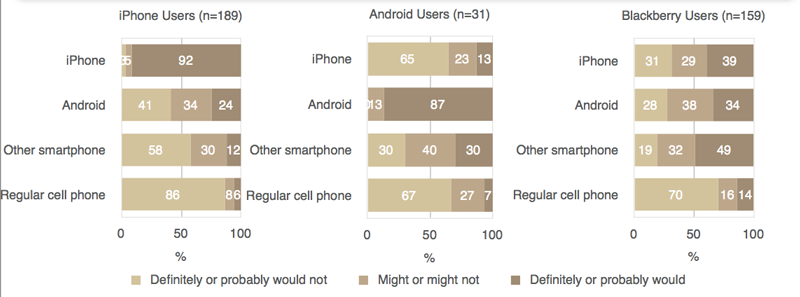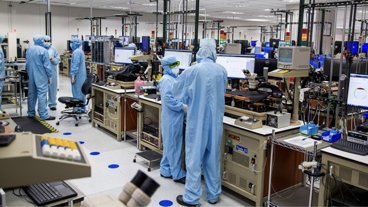A study released this week from Crowd Science found that 39 percent of BlackBerry owning respondents said they "definitely or probably would" switch to an iPhone if they had to buy a new handset "tomorrow." Another 29 percent said they were unsure, while 31 percent are unlikely to buy Apple's handset.
The survey carried even more good news for Apple, as 92 percent of iPhone users said they are satisfied with their purchase and would likely make their next smartphone another iPhone.
Users of the Google Android mobile operating system were also satisfied, with 87 percent saying they would buy another Android handset. In addition, 34 percent of BlackBerry owners would strongly consider buying an Android phone if they were to make an immediate purchase.
The study also found that 97 percent of iPhone users would recommend the product to their friends, and 52 percent of BlackBerry owners and 51 percent of other smartphone users would recommend the iPhone to others.
The study was of 1,140 respondents recruited via the Crowd Science Sample Beta program from Web sites serving more than 20 million unique visitors. Totaling 44 percent, most respondents were users of a traditional cellphone rather than a smartphone. iPhone users represented 17 percent of those polled, BlackBerry users amounted to 15 percent, Nokia 10 percent, Windows Mobile 4 percent, Android 3 percent and Palm 2 percent.
It's not the first study to find astronomically high satisfaction rates with the iPhone. Last August, one survey found that 99 percent of respondents said they were overwhelmingly satisfied with the latest iPhone model.
In fact, when compared with other companies in surveys, the Cupertino, Calif. company consistently outperforms its competitors in customer satisfaction and service.
 Sam Oliver
Sam Oliver








 Charles Martin
Charles Martin
 Marko Zivkovic
Marko Zivkovic
 Andrew Orr
Andrew Orr
 Amber Neely
Amber Neely

 William Gallagher and Mike Wuerthele
William Gallagher and Mike Wuerthele










100 Comments
And in another survey, 96% said they would prefer a chocolate milkshake over a poke in the eye.
If it wasn't on the AT&T network.
I am surprised 13% of Android users are ready to bail...
Must all be male.
Bye bye, Google!
1140 respondents. You can sometimes infer some things from small samples with statistical confidence, but in this case the heavy data splits perhaps gives it too much weight.